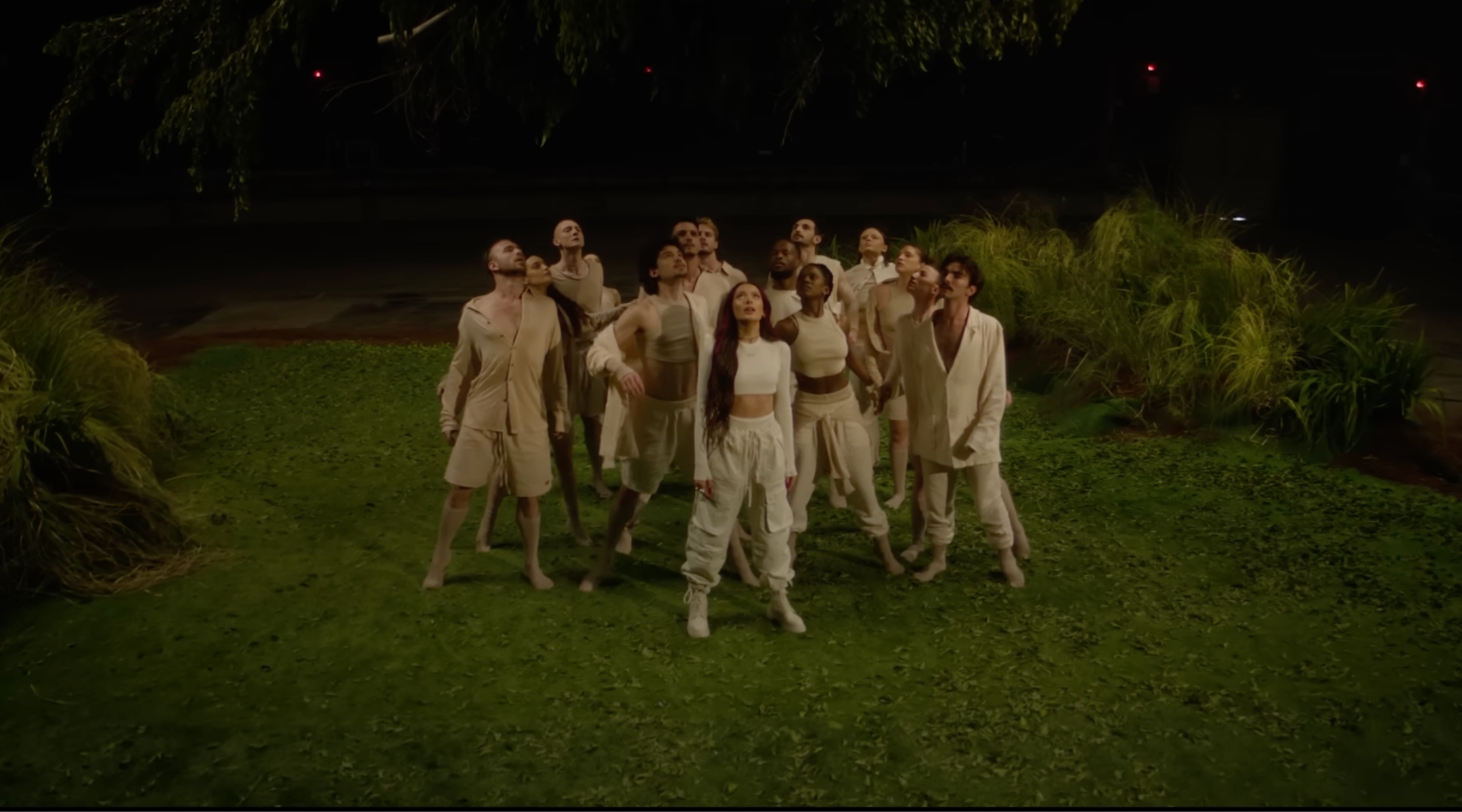Music video for ‘Hurricane,’ Israel’s Eurovision entry, released after changes that tone down references to Oct. 7
Key themes of the song, to be performed by the singer Eden Golan, have changed, though some allusions to the attack remain

Eden Golan (center) in the music video for “Hurricane,” Israel’s entry for the 2024 Eurovision Song Contest. (Screenshot via YouTube)
(JTA) — After weeks of uncertainty about its participation in the Eurovision Song Contest, Israel has released a video for its entry, “Hurricane,” a reworking of an earlier song called “October Rain” that was rejected for being too political.
The European Broadcasting Union, which runs Eurovision, reportedly barred “October Rain” because of lyrics referring to Hamas’ Oct. 7. attack on Israel. A second-choice song, “Dance Forever,” which also referred to the attack and the massacre at an outdoor dance party, was likewise rejected.
Now, a third version that uses the melody and many of the lyrics from the first song has been approved for the competition, which will take place in Malmo, Sweden, in May.
Key themes of the song, to be performed by the singer Eden Golan, have changed, though some allusions to the attack remain. The word “flowers,” which means “fallen soldiers” in Israeli military jargon, was removed. Part of the chorus, which previously said, “I’m still wet from this October rain” now says, “I’m still broken from this hurricane.”
Shayna Weiss, a scholar of Israeli pop culture, said the song reminded her of Ukraine’s 2016 Eurovision entry, titled “1944,” which won the contest that year. “I think they tried the Ukraine route,” she said.
“1944,” sung by Ukrainian artist Jamala, is about the deportation of the Tatar ethnic minority from Crimea in that year. The song was performed two years after Russia seized and annexed Crimea from Ukraine.
The song didn’t contain direct historical references to the deportation of the Crimean Tatars as ordered by Joseph Stalin, but those familiar with the history knew exactly what it was about, said Weiss.
“Russia complained that the song was too political and Eurovision allowed it. There weren’t direct references in the song,” said Weiss, associate director of the Schusterman Center for Israel Studies at Brandeis University.
“My guess is that they were going for the same playbook with calling it ‘October Rain,’ but [in] the song itself, they were trying not to have references, although obviously there were references in the original lyrics,” Weiss added. “That didn’t work. But I think this is sort of the same playbook. And there are still clear references even in this new version of ‘Hurricane.’ They’re just not as overt.”
“Hurricane” also features a different Hebrew outro than “October Rain.” The original song’s Hebrew lyrics said, “There is no air left to breathe / There is no room / I am gone day to day / They were all good children, each one of them.”
That has been amended to, “Don’t need big words / Just prayers / Even if it’s hard to see / You always leave me one small light.”
Weiss said that the outro clearly alludes to Oct. 7, but added that it allows for “plausible deniability.”
“Those words can mean a lot of different things,” Weiss said. “That’s probably how they were allowed. But it’s obvious what they mean when it’s Israel’s entry to Eurovision.”
Some of the imagery in the music video can be read to allude to the massacre at the outdoor festival, which was held in a field outside at Kibbutz Re’im on the Gaza border. The video shows Golan kneeling in a field strewn with fallen leaves, and at another point shows an uprooted tree hanging upside down.
The chorus also contains the words “Baby, promise me you’ll hold me again,” a possible reference to the Israeli hostages taken by Hamas and held captive in Gaza.
Ahead of the first live performance of the song last Sunday night, Golan told Kan 11, the Israeli public broadcaster that airs Eurovision, that she thought the song had a more personal theme.
“I think the message is clear,” she said. “It’s about a woman who is going through a personal crisis — a hurricane.”
But Weiss said that the genre of “Hurricane” — it’s a soulful ballad, while more recent Israeli Eurovision entries have been more upbeat — also hints at tragedy.
“The tone — it’s a sad song,” she said. “It’s about someone going through something. It’s very soulful.”
Golan, 20, was born in Israel and moved to Russia when she was 6 years old. Her family returned to Israel in 2022 at the start of the Ukraine war.
“I am full of emotions and feelings, just at the peak,” she said in another interview Sunday night on Kan. “I’ve already managed to cry and scream and I’m so glad it’s out and everyone can hear and listen together.”
The lyrics to the new song were written by Avi Ohayon and Keren Peles, with music written by Ohayon, Peles, and Stav Beger. They are hoping to make “Hurricane” the country’s fifth Eurovision winner; Israel most recently won the competition in 2018 with Netta Barzilai’s “Toy.”
But Israel faced backlash before the song was even released. The EBU is facing pressure to ban Israel from participating in the competition due to the war in Gaza. There is precedent for banning a country from participating in Eurovision due to its policies, such as Russia in 2022 and since during the war in Ukraine. Groups in multiple countries have said they would withdraw from Eurovision if Israel were to compete, but none so far has formally announced a boycott of the competition.
This article originally appeared on JTA.org.
















